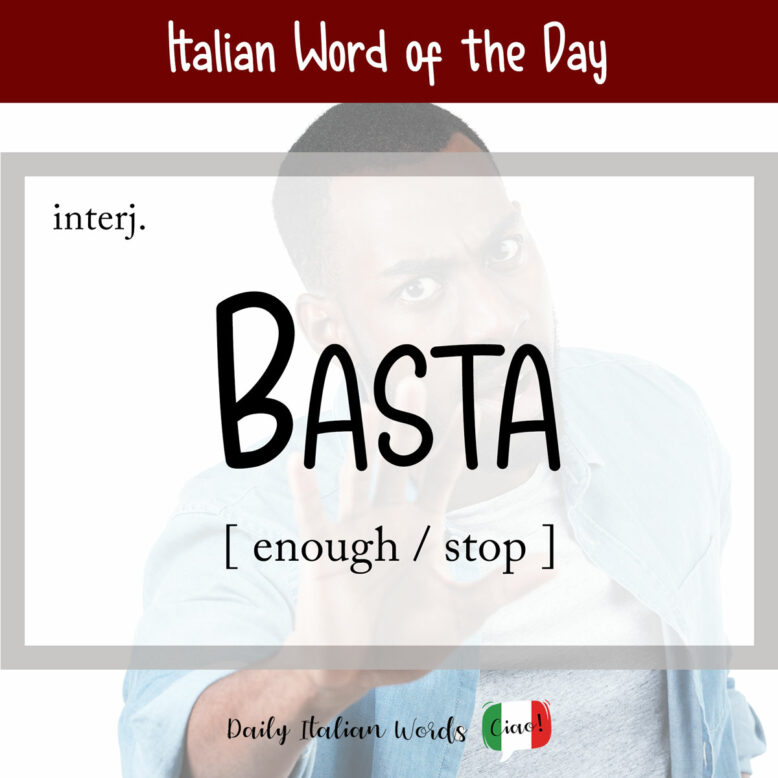We recently conducted a survey on our Facebook group, asking them which words their parents used with them most frequently. Unsurprisingly, the short yet powerful word “basta” ranked very close to the top of the list.

Basta, when used as an interjection, has a couple of primary translations in English. The first is (that’s) enough, and the second is stop (it).
Basta urlare! Non riesco a sentire la TV!
Stop yelling! I can’t hear the TV!
Basta! Se continui a fare così, ti mando a letto!
(That’s) enough! If you continue to behave like that, I’ll send you to bed!
When serving a drink to someone, it is common to use the phrase “tell me / say when” in English as an invitation for them to indicate when to stop pouring. In Italian, this expression can be translated as dimmi (quando) basta.
Quanto basta, on the other hand, means “as required” or “just enough” of something.
Aggiungi zucchero quanto basta, ma senza esagerare.
Add just enough sugar, but don’t overdo it.
You may have seen basta followed by che, in which case it is an informal way of saying “as long as” or “provided that”. In some cases, it can also mean “you just need to…”.
Basta che tu mi dica la verità.
You just need to tell me the truth.
Basta che andiamo tutti insieme e sarò felice.
As long as we all go together, I’ll be happy.
Basta followed by an infinitive verb best translates to “just…” or “all you need / all you have to do…”.
Basta dirmi la verità e io me ne vado.
All you need to do is tell me the truth and I’ll leave.
Basta aggiungere un cucchiaio di zucchero e avrà un gusto migliore.
Just add a spoonful of sugar and it will taste better.

Basta comes from the verb bastare, which means “to be enough” or “to suffice”. Here is how it is conjugated in the present tense:
- io basto = I am enough
- tu basti = you are enough (informal, singular)
- lui basta = he is enough
- lei basta = she is enough
- Lei basta = you are enough (formal, singular)
- noi bastiamo = we are enough
- voi bastate = you are enough (plural)
- loro bastano = they are enough
The verb makes an appearance in the title of the famous song by Lucio Dalla, Tu non mi basti mai (I can never get enough of you).
Some classic phrases you will often hear that contain basta include:
- Adesso / Ora basta! = That’s enough now!
- E basta! = Enough already!
- Basta così = That’s enough
- Punto e basta! = And that’s that! / …period! / End of story!
- Basta e avanza = There’s more than enough
- Basta poco = It doesn’t take much
- Basta volerlo = Anything is possible if you want it enough
- Basta dire che… = Suffice it to say…
Heather Broster is a graduate with honours in linguistics from the University of Western Ontario. She is an aspiring polyglot, proficient in English and Italian, as well as Japanese, Welsh, and French to varying degrees of fluency. Originally from Toronto, Heather has resided in various countries, notably Italy for a period of six years. Her primary focus lies in the fields of language acquisition, education, and bilingual instruction.


